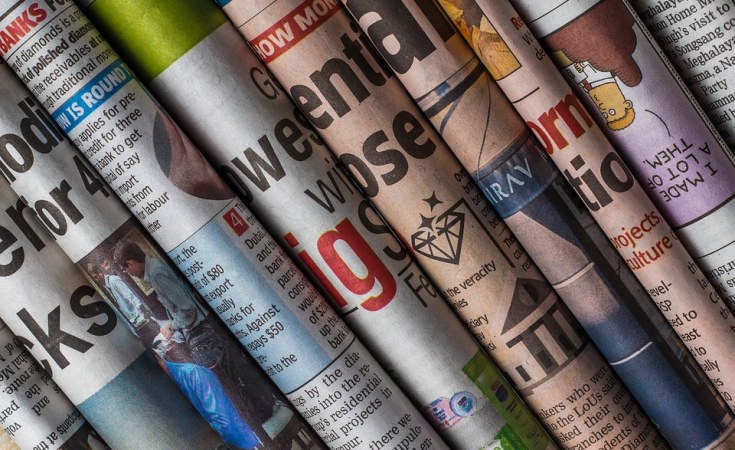The experts spoke at a conference about the future of the media in Nigeria, particularly its viability and profitability.
Media professionals and academics met Wednesday to discuss the financial viability and sustainability of the media in Nigeria.
The experts spoke at a conference hosted by the International Centre for Investigative Reporting (ICIR) in Abuja to commemorate the 10th anniversary of the organisation.
Speaking at Wednesday's event, the Executive Director and Founder of the ICIR, Dayo Aiyetan, said it is imperative to hold a national conversation about the future of the media in Nigeria, particularly its viability and profitability.
Mr Aiyetan said Wednesday's event was organised to serve as a starting point for the discussion. He called on professional bodies and media associations to organise a broader event about the future of the media.
"Many news organisations are not profitable because of dwindling sales and advertising revenue. Many media companies cannot pay salaries and are laying off staff. The media in Nigeria is haemorrhaging," he said, adding that industry leaders must discuss how to find profitable ways of running media businesses.
The essential obligation of the media is to hold authorities accountable, Mr Aiyetan said in his opening address. "And by doing that, we are only complimenting the work of anti-corruption agencies of the government."
He added that public officials should see the media as partners if they are serious about fighting corruption instead of resorting to harassment and intimidating journalists.
In his submission, Bongani Sinqoko, who delivered the keynote address on 'Sustainability Imperatives for African Media', acknowledged the fact that the media industry in Africa, and indeed globally, is experiencing existential challenges.
Mr Sinqoko, a strategist at Arena Holdings, one of Africa's largest English-language newspaper publishers in South Africa, argued that to overcome this challenge of sustainability, the media must be purpose-driven and diversify its business model.
"There is much to our business other than selling adverts and subscriptions," he said. "To build a sustainable media, you must have a clear purpose and pride yourself with competence and the culture of excellence."
He said media owners must drop the conventional measures of sustainability and innovate a way out of the industry disruption facing news media today.
Mr Sinqoko, however, cautioned that all innovative models must not tamper with the editorial independence of the media.
The consumption pattern of the news has changed with the advent of social media, Mr Sinqoko added; hence the need to "transition from a news business to content business."
Panellists Speak
In her submission, Kadaria Ahmed, the founder of Radionow, said her primary responsibility as a journalist is to hold power accountable, not to run a business. However, "I am of the opinion that content should be produced to enable me to do the job properly in an environment where accountability journalism is not commercially viable," she said.
The other currency you need which is missing in the Nigerian media is trust, she said. "The Nigerian audience no longer trusts the media. As far as they are concerned, we are bought by politicians and the cooperates. In addition to that, we do a great disservice to ourselves because we have become part of the problem of Nigeria."
Our journalism must set the country on the right path, Ms Ahmed said, and the "first element of sustainability that the media needs is for the country to function and that functionality of the country depends on the role journalists play."
On her part, Abigail Ndisike, a professor of Mass Communication at the University of Lagos, argued that the modern media must address issues of consumer needs.
"You must do audience categorisation and auditing. This would help to know how best to reach the audience, whether through influencers or any other way. This would help to keep and sustain partnership with the audience."
Also, Angela Agoawike, the CEO of Omalicha radio, said that "media managers have to look at ways of maximising what they do."
There must be a strategy to manage media business and media as the Fourth Estate of the Realm, she said. That balance must be there for sustainability without pulling down the role of media as the watchdog, she added.
Media organisations must come together and come up with a clear policy on the operating environment which includes technology among other factors, the don said.
Similarly, Umaru Pate, the Vice-Chancellor of the Federal University, Kashere, Gombe State, said media houses must adopt innovative business models to overcome sustainability challenges.
"Evolution of the internet and the changes in technology has changed the content demand from our audience," he said, noting that the government must support the media with relevant policies.
"Amazon and Google are taking all the big adverts today. We can have a share of that if we have a favourable policy from the government", the vice-chancellor said.
In his submission, the former Editor-in-Chief of the Daily Trust newspaper, Mannir Dan-Ali, harped on the need for collaboration to foster growth and boost engagement in the media industry.
The opportunities in this business are limitless, he said. "We must remain committed and collaborate and engage the market," Mr Dan-Ali said.
In his goodwill message, Dapo Olorunyomi, the Publisher of PREMIUM TIMES, congratulated ICIR on its ten years of impact.
Mr Olorunyomi aligned himself with previous speakers that called on innovative models to sustain the media business.
According to him, the media must see itself as a producer of technological products in order to operate in a sustainable manner.
"There is a need for us to build the media as a knowledge organisation," Mr Olorunyomi said, urging the media to ensure proper gatekeeping to defend Nigeria's democracy.
"If this country must survive, the media must be an instrument that drives accountability," he said.


